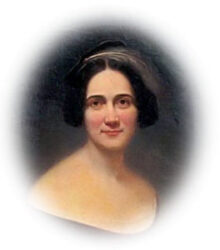Saturday.–The President will be with us here in Columbia next Tuesday, so Colonel McLean brings us word. I have begun at once to prepare to receive him in my small house. His apartments have been decorated as well as Confederate stringency would permit. The possibilities were not great, but I did what I could for our honored chief; besides I like the man–he has been so kind to me, and his wife is one of the few to whom I can never be grateful enough for her generous appreciation and attention.
I went out to the gate to greet the President, who met me most cordially; kissed me, in fact. Custis Lee and Governor Lubbock were at his back.
Immediately after breakfast (the Presidential party arrived a little before daylight) General Chesnut drove off with the President’s aides, and Mr. Davis sat out on our piazza. There was nobody with him but myself. Some little boys strolling by called out, “Come here and look: there is a man on Mrs. Chesnut’s porch who looks just like Jeff Davis on postage-stamps.” People began to gather at once on the street, Mr. Davis then went in.
Mrs. McCord sent a magnificent bouquet–I thought, of course, for the President; but she gave me such a scolding afterward. She did not know he was there; I, in my mistake about the bouquet, thought she knew, and so did not send her word.
The President was watching me prepare a mint julep for Custis Lee when Colonel McLean came to inform us that a great crowd had gathered and that they were coming to ask the President to speak to them at one o ‘clock. An immense crowd it was–men, women, and children. The crowd overflowed the house, the President’s hand was nearly shaken off. I went to the rear, my head intent on the dinner to be prepared for him, with only a Confederate commissariat. But the patriotic public had come to the rescue. I had been gathering what I could of eatables for a month, and now I found that nearly everybody in Columbia was sending me whatever they had that they thought nice enough for the President’s dinner. We had the sixty-year-old Madeira from Mulberry, and the beautiful old china, etc. Mrs. Preston sent a boned turkey stuffed with truffles, stuffed tomatoes, and stuffed peppers. Each made a dish as pretty as it was appetizing.
A mob of small boys only came to pay their respects to the President. He seemed to know how to meet that odd delegation.
Then the President’s party had to go, and we bade them an affectionate farewell. Custis Lee and I had spent much time gossiping on the back porch. While I was concocting dainties for the dessert, he sat on the banister with a cigar in his mouth. He spoke very candidly, telling me many a hard truth for the Confederacy, and about the bad time which was at hand.






